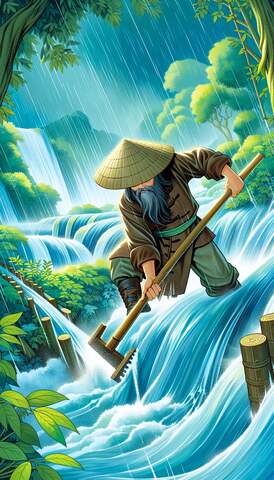
很久以前,在尧的时代,中国有很多河流。
这些河流有时候会发大水,把田地和房子都冲走,人们过得很苦。
但是,有一个叫大禹的人,他决定帮助大家解决这个问题。
大禹拿着工具,带领大家一起挖河、疏浚洪水,让水能够流入大江河里。
他的工作非常辛苦,每天都在风雨中劳动,连腿上的肉都被磨掉了,小腿的汗毛也都没了。
但他不怕困难,只想早点消除洪水,让人们可以安居乐业。
在一本叫《庄子·天下》的书里,墨子称赞大禹是“沐甚雨,栉疾风”。
这意思是说,大禹在风雨中劳动,就像洗澡和梳头一样。
他还鼓励后世的墨家,穿粗布衣服,穿木鞋草鞋,日夜不停地工作,把艰苦朴素当作自己的行为准则。
如果有人不这样做,就不符合大禹的精神,也不配称为墨家。
从那以后,“栉风沐雨”就成为了一个成语,用来形容那些在外奔走、辛勤工作的英雄们。
我们也可以用“沐雨栉风”来表达同样的意思。
Long ago, during the reign of Yao, China had many rivers.
Sometimes these rivers would flood, washing away fields and houses, making life very difficult for people.
But there was a man named Da Yu who decided to help solve this problem.
Da Yu took up his tools and led everyone in digging rivers and dredging floods, allowing the water to flow into the great rivers.
His work was very hard. He labored every day in wind and rain, so much so that the flesh on his legs was worn away and the hair on his calves disappeared.
But he was not afraid of difficulties. All he wanted was to eliminate the floods as soon as possible so that people could live and work in peace.
In a book called 'Zhuangzi·Tianxia', Mozi praised Da Yu as 'bathing in heavy rain and combing through strong winds'.
This means that Da Yu worked in wind and rain just like taking a bath or combing his hair.
He also encouraged future Mohists to wear rough cloth clothes, wooden shoes, and straw sandals, working day and night, taking hardship and simplicity as their guiding principles.
If anyone did not do so, they would be against the spirit of Da Yu and unworthy to be called a Mohist.
Since then, 'Braving the Wind and Rain' has become an idiom, describing heroes who travel far and work hard.
We can also use 'Bathing in Rain and Combing through Wind' to express the same meaning.